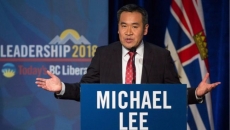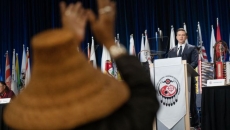British Columbia will be opening secure facilities to provide involuntary care under the Mental Health Act for those with severe addictions who are mentally ill and have sustained a brain injury, the premier announced Sunday just days ahead of the start of a provincial election campaign.
David Eby pledged a re-elected NDP would change the law in the next legislative session to "provide clarity and ensure that people, including youth, can and should receive care when they are unable to seek it themselves."
Eby told a news conference in Vancouver that involuntary help would be aimed at people struggling with overlapping addictions, mental illness, and brain injury concerns who are not able to ask for help for themselves.
"For people with these three overlapping conditions, we know that the current response that we offer is not adequate," he said.
"It is costly for people struggling with these conditions. They are not safe, and increasingly, I'm concerned that the way that they are interacting in our communities is making everybody less safe."
The premier's promise comes ahead of Saturday's anticipated launch of the provincial election campaign, in which concerns about the toxic drug crisis are expected to play a significant role, and three months after he appointed Dr. Daniel Vigo as B.C.'s first chief scientific adviser for psychiatry, toxic drugs and concurrent disorders.
Vigo said Sunday that most people with addictions in British Columbia are not mentally impaired and are able to seek help voluntarily.
“However, the system breaks down if services operate under the assumption that all the patients should be able to actively seek help, endure taxing intake processes where comorbidity is not considered, input from providers … is not valued, and impairments affecting their ability to consent become an exclusion criteria," he said.
Vigo said that in order for a person to be treated involuntarily under the act, they currently have to have a mental disorder that leaves them unable to interact safely with others and regulate their own behaviour.
Eby said the province’s hospitals interpret the current Mental Health Act inconsistently, so Vigo will be sending out clarifications on how it can be applied in cases involving addiction before the legislation is formally changed.
Eby said the first site providing care for those with addictions, mental illness and brain injuries will open in Maple Ridge on the grounds of the Alouette Correctional Centre "in the coming months," adding there are plans to expand throughout the province.
This is not the first time the B.C. government has proposed involuntary care for youth with addictions.
In 2022, a plan that would have forced youth to undergo treatment for up to seven days after an overdose was scrapped following public criticism.
Eby said Sunday he understands the concern that youth might be less likely to ask for help if they fear being taken to treatment against their will.
"So these are the things we're trying to balance as a society. It's incredibly challenging, and our goal is to work with ... the experts in this area, because I think that we need to keep revisiting these decisions and make sure that they're taking us in the right direction," he said.
Last week, B.C. Conservative Leader John Rustad said if elected, he would introduce legislation to allow for involuntary treatment and build secure facilities.
In a statement Sunday, Rustad said Eby was being inconsistent and “flip-flopping” after years of not acting on the issue.
B.C. Greens Leader Sonia Furstenau accused Eby in a separate statement of following "John Rustad off every reactionary cliff" and said she was concerned about an over-reliance on involuntary care.
Furstenau said the province already has thousands of people receiving some form of involuntary treatment annually.
"Where are the investments in prevention and addressing the root causes of what we’re seeing in our communities? There’s also no focus on long-term, community-based care after discharge," she said.
A government statement said the NDP is building more than 400 mental-health beds at new and expanded hospitals in B.C. by modernizing approximately 280 outdated beds and adding more than 140 new ones "with more to come."
It says all of these facilities will also provide both voluntary and involuntary care under the act.
The announcement comes after a series of stranger attacks in the province alleged to have been committed by those who are mentally ill.
A man was arrested earlier this month in Vancouver for separate attacks that left one man dead and another with a severed hand. Police later said the suspect had a history of mental illness.
Eby said the province will also be setting up a designated mental-health unit in a B.C. correctional centre, starting with a 10-bed facility at the Surrey Pretrial Services Centre to provide rapid treatment for people with mental-health and addiction challenges who are being held in custody.






